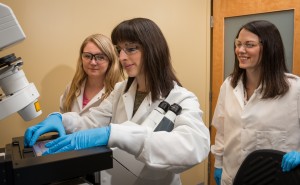Students in Dr. Emily Day’s research group have published a paper in the International Journal of Nanomedicine describing a new way to sensitize cancer cells to chemotherapy. Chemotherapy resistance in cancer is often attributed to cancer cells’ ability to keep drugs outside the cell. The Day lab has shown that this resistance mechanism can be overcome by heating cancer cells with photothermal therapy, a technique in which nanoparticles delivered to cancer cells produce heat upon exposure to light. The Day lab’s results demonstrate that applying heat to cancer cells with photothermal therapy can increase drug accumulation in the cells, which in turn improves treatment effect. The student co-authors on the paper include Brittany Fay, who received her B.S. in Biomedical Engineering at UD in May 2015, and Jilian Melamed, current Biomedical Engineering Ph.D. student. This research was supported by an Institutional Development Award (IDeA) from the National Institute of General Medical Sciences (NIGMS) of the National Institutes of Health (NIH), by the Delaware INBRE program with a grant from NIGMS of the NIH, by the University of Delaware Summer Scholars Program, and by the Department of Defense through a National Defense Science and Engineering Graduate Fellowship.
- Innovating in motionUD’s Big Ideas Challenge advances novel approach to help people with Achilles tendinopathy keep moving.
- Engineering for ImpactBiomedical engineering graduate student Mikayla Jackson received 2025 Laird Fellowship.
- Get ready for GivingTuesday!Join the UD community in supporting your favorite causes and projects during the global giving day.
- Innovation Ambassador: Catherine FromenAdvancing novel technologies along the commercialization pathway.
- Why Achilles tendon injuries resist treatmentUD researchers seek to uncover how anatomical differences may influence recovery.

